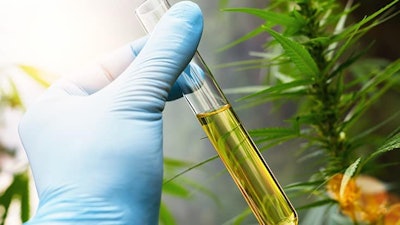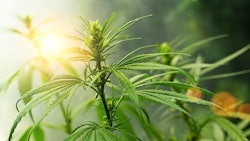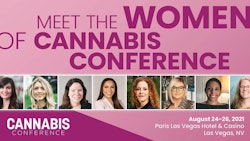
Delta-8-tetrahydrocannabinol (THC) has made headlines lately for being a hemp derivative that can produce psychoactive effects. But U.S. Hemp Roundtable (USHR), a national industry business advocacy organization, says that’s not a good thing.
The organization recently released a statement against “marketing products, under the guise of the hemp name, for any intoxicating value or euphoric effect,” calling it “irresponsible.”
While USHR did not explicitly name delta-8-THC in its statement, the press release linked to two articles that detail this so-called loophole—one in the New York Times, and another in Rolling Stone.
“You have a drug that essentially gets you high, but is fully legal,” Lukas Gilkey, chief executive of Texas-based Hometown Hero CBD, told NYT when describing delta-8-THC. “The whole thing is comical.”
Delta-8-THC is typically found in small concentrations in hemp naturally, but it can also be converted from CBD. It’s something hemp processors have begun profiting from—a February report from pricing agency Hemp Benchmarks found delta-8 distillate pricing experienced its first price increase in seven months. And NYT reports it is the fastest-growing segment of hemp products.
However, the controversial cannabinoid presents a rift for those working to promote hemp’s therapeutic properties rather than its psychoactive ones.
“Unlike marijuana, hemp is, by definition, not intoxicating,” USHR says in its statement. “Rather, hemp products like CBD are popularly used by consumers to benefit their general health and wellness, not to get them high.”
The USHR’s statement comes as the legality of delta-8-THC has come into question with administration of the U.S. Drug Enforcement Administration’s (DEA’s) interim final rule on hemp. That rule, which is currently being contested in court by the Hemp Industries Association (HIA), could potentially open the door for the DEA to crack down on delta-8 production, attorneys told Hemp Grower in August.
READ MORE: What the DEA's Interim Final Rule on Hemp Really Means For The Industry
The statement also comes as industry organizations are working to collaborate with federal agencies on both creating and honing hemp-related regulations, including urging the U.S. Food and Drug Administration (FDA) to create a regulatory pathway for cannabidiol (CBD) and eliminating contentious aspects of the U.S. Department of Agriculture’s (USDA’s) final rule.
Much of hemp’s legality is based on the fact that it is largely not naturally psychoactive, as it has below 0.3% delta-9-THC. Beginning to promote hemp as having any intoxicating properties may muddle that conversation.
In its statement, the USHR added that adult-use cannabis products that are intoxicating “should not be marketed as dietary supplements, and should be subject to a distinct regulatory pathway.”
“We look forward to working with Congress and federal agencies to develop responsible laws and regulations to provide separate pathways and proper guardrails to distinguish these products,” USHR said. “HR 841, which would establish a regulatory pathway for the sale of hemp-derived extracts like CBD, is an important starting point.”

























